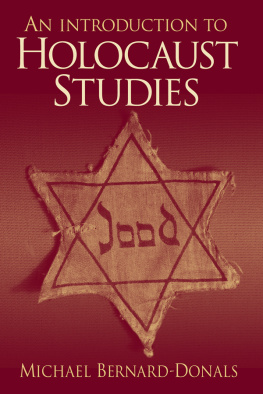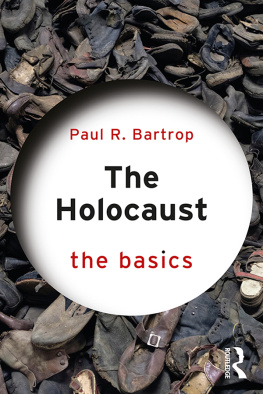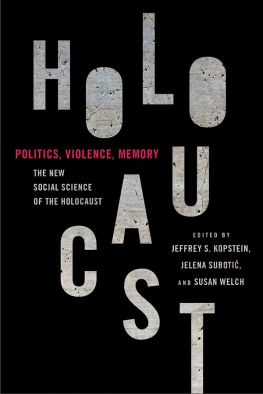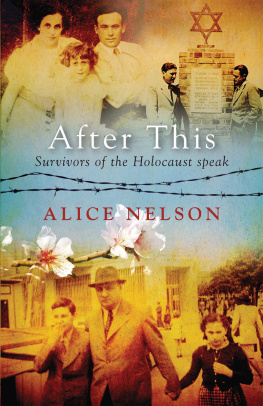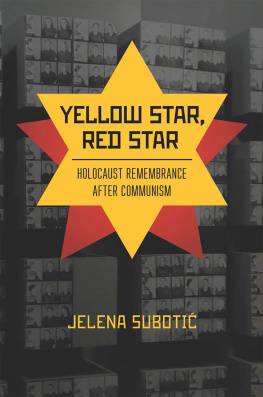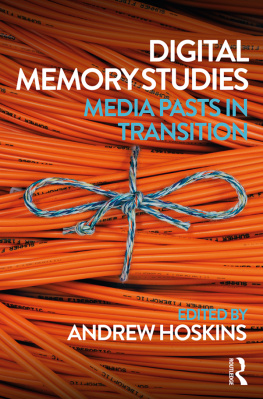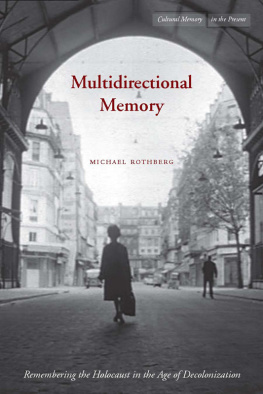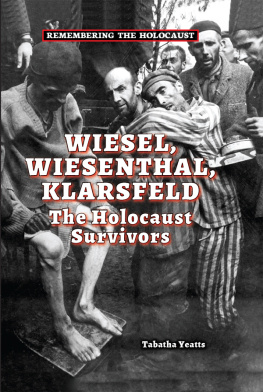STANFORD STUDIES IN JEWISH HISTORY AND CULTURE
Edited by David Biale and Sarah Abrevaya Stein
HOLOCAUST MEMORY IN THE DIGITAL AGE
Survivors Stories and New Media Practices
JEFFREY SHANDLER
Stanford University Press
Stanford, California
Stanford University Press
Stanford, California
2017 by Jeffrey Shandler. All rights reserved.
No part of this book may be reproduced or transmitted in any form or by any means, electronic or mechanical, including photocopying and recording, or in any information storage or retrieval system without the prior written permission of Stanford University Press.
Printed in the United States of America on acid-free, archival-quality paper
Library of Congress Cataloging-in-Publication Data
Names: Shandler, Jeffrey, author.
Title: Holocaust memory in the digital age : survivors stories and new media practices / Jeffrey Shandler.
Other titles: Stanford studies in Jewish history and culture.
Description: Stanford, California : Stanford University Press, 2017. | Series: Stanford studies in Jewish history and culture | Includes bibliographical references and index.
Identifiers: LCCN 2016052823 (print) | LCCN 2016053579 (ebook) | ISBN 9781503601956 (cloth : alk. paper) | ISBN 9781503602892 (pbk. : alk. paper) | ISBN 9781503602960 (e-book)
Subjects: LCSH: USC Shoah Foundation Institute for Visual History and EducationArchives. | Holocaust, Jewish (19391945)Historiography. | Holocaust survivorsInterviews. | Collective memory. | Digital media.
Classification: LCC D804.348 .S45 2017 (print) | LCC D804.348 (ebook) | DDC 940.53/18072dc23
LC record available at https://lccn.loc.gov/2016052823
Typeset by Bruce Lundquist in 10/15 Minion
CONTENTS
ACKNOWLEDGMENTS
I began exploring the Visual History Archive (VHA) at Rutgers in 2010, when, thanks to the initiative of Douglas Greenberg, the university first gained online access to the Archive. I am indebted to Doug not only for his sparking of my interest in the VHA but also for his continued encouragement of my work. Conversations with Rutgers colleagues Ethel Brooks, Michael Levine, Karen Small, and Yael Zerubavel have also stimulated my thinking about the VHA, and I am particularly grateful to Yael for prompting me to write my first paper on the topic for a conference at Rutgers in 2011. In addition, I thank the School of Arts and Sciences at Rutgers for providing me with a sabbatical and a fellowship leave, which were essential to the research and writing of this book, and Department of Jewish Studies staff members Sherry Endick and Arlene Goldstein for their help in bringing this book to fruition. During the final year of work on the manuscript, I benefited greatly from the assistance of Valerie Mayzelshteyn, my Aresty Research Assistant at Rutgers, who diligently and thoughtfully examined dozens of segments of VHA interviews and compiled the information in the .
The USC Shoah Foundation provided invaluable assistance to my research, including the opportunity to spend several months in 2013 at the University of Southern California as a visiting fellow. This visit enabled me to learn about the workings of the VHA from its dedicated staff and to discuss my work in progress with them. I am deeply grateful for the generosity with which the Foundations staffespecially Douglas Ballman, Crispin Brooks, Rene Firestone, Georgiana Gomez, Ita Gordon, Kia Hayes, Karen Jungblut, Dan Leshem, Kim Simon, Stephen Smith, Anne-Marie Stein, Kori Street, and Ari Zevshared their advice and expertise. During my stay at USC, I also benefited from the counsel of faculty members Wolf Gruner, Tara McPherson, and Michael Renov, and I am particularly grateful to Tara for inviting me to write an essay on some of this research for a special issue of American Literature, which she edited, on new media. Part of this essay, Holocaust Survivors on Schindlers List; or, Reading a Digital Archive against the Grain, originally published in the journals December 2013 issue (vol. 85, no. 4), appears in of this book and is reproduced with permission of Duke University Press.
For their kind assistance during the writing and research of this book, I also thank Rachel Baum, Sarah Bunin Benor, Esther Brumberg, Hinde Burstin, Elizabeth Castelli, Alexandra Garbarini, Bonnie Gurewitsch, Louis Kaplan, Marjorie Kaplan, Judith Keilbach, Todd Presner, Alasdair Richardson, and Melissa Shiff, as well as all the participants in the seminar on Video Interviews of Holocaust Survivors: Intersecting Approaches, convened at the annual Association for Jewish Studies conference in 2013. I am especially indebted to Ayala Fader and Diane Wolf for their insightful comments on drafts of the manuscript. Opportunities to present lectures on aspects of my research at Vassar College, the YIVO Institute for Jewish Research, Humboldt-Universitt, the American University of Paris, and Universitt Wien afforded me invaluable occasions to learn from audience comments and questions. At Stanford University Press, David Biale, Margo Irvin, Nora Spiegel, Sarah Abrevaya Stein, and Kate Wahl provided vital support and guidance for the development of this publication.
Last, but foremost, I thank Stuart Schear, my partner in life, who has been this books first reader, sharpest editor, and greatest enthusiast.
AUTHORS NOTE
All transcriptions from VHA interviews are mine, except where indicated. Transcriptions of English-language interviews preserve speakers grammatical irregularities. Ellipses indicate abridgements made by me. Translations from interviews in languages other than English, except where indicated, are mine as well. Names of people are spelled per the listing in the VHA, except where indicated.
...
Bracketed additions to transcriptions include the following.
Definitions and translations: goyim [Yiddish: gentiles]. The name of the language is omitted when it is clear. In interview transcriptions, Yiddish is romanized according to the speakers dialect: a yid a seykher [a Jew (who was) a merchant].
Referents, added to disambiguate pronouns and other references: he [i.e., Spielberg].
Insertions and clarifications, added when the meaning of the cited text is not readily apparent: he came... to us [in the factory in 19]44, [he was there for] just a few months.
Descriptions of interviewees gestures and camera movements: I start to run, and I feel the first bullet here. (He points to his left wrist.) See? The marks are still here. (The camera pushes in on his forearm, then pulls out again.)
INTRODUCTION
On any given day, individuals around the world sit before computer screens to watch and listen to videotaped interviews with Holocaust survivors. More than seven decades after the end of World War II, many people approach this resource with some expectation of what they will encounter, reflecting their various intents: Descendants of deceased Holocaust survivors view these recordings to learn about their ancestors prewar lives and wartime experiences as well as about relatives killed during the war. High school students are exhorted to listen to survivors narratives as morally galvanizing exemplars. Historians screen these videos to research instances of Nazi persecution that are otherwise undocumented. Psychologists scrutinize survivors storytelling for insights into how people cope with trauma. Victims of more recent genocides listen to these recordings to discover how, decades after the Holocaust, its survivors articulate their memories.
At the same time that screening these videos addresses an array of established objectives, the accounts survivors offer are full of surprises. For as much as these interviews are shaped by the protocols of the projects that produced them and by decades of accumulating tropes of Holocaust remembrance, each video documents a singular encounter with an individual who takes a distinct approach to the task of recalling the past. What, then, are viewers of these videos to make of moments when, in the course of describing his or her experience of the genocide, a survivor bursts into song, starts speaking in another language, or exposes bodily scars of wartime injuries? What is the significance of survivors comparing their own experiences during the war to how the Holocaust is portrayed in a novel or feature film? What might be the value of videos in which interviewers prompt survivors answers or argue with interviewees? How should one understand those moments when survivors cant recall the past or resist doing so? Moreover, what do these moments reveal about the potential significance of the videos generally, above and beyond the value invested in them by their creators and advocates? And how do these moments elucidate the efforts to record, preserve, and share these memories with this choice of medium?
Next page

